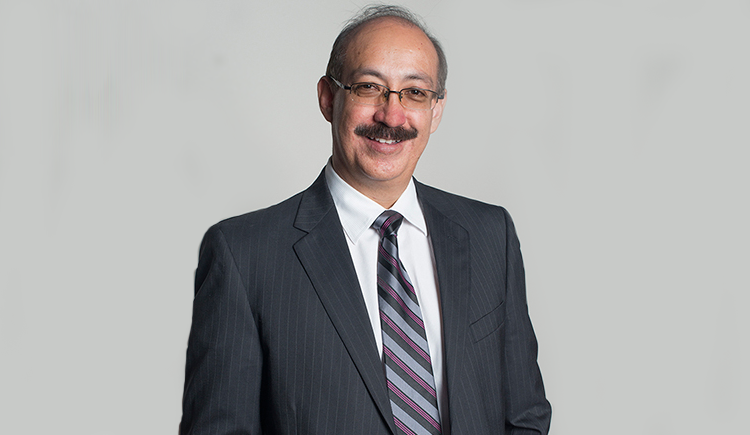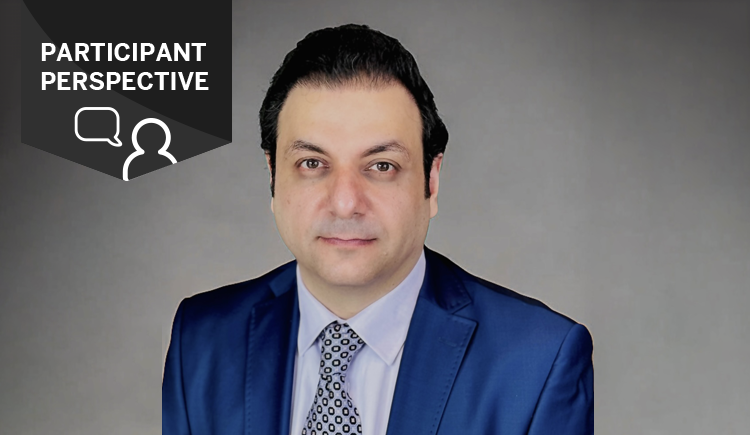
Endocrinologist A. Enrique Caballero, MD, has devoted his career to improving the quality of care for people with diabetes who experience health inequities. He recently received the Harold Amos Faculty Diversity Award through the Harvard Medical School (HMS) Office for Diversity Inclusion & Community Partnership in recognition of the thousands of lives his multi-faceted efforts have impacted. This award is presented to HMS and Harvard School of Dental Medicine faculty members who are making real strides in furthering health equity, diversity, and inclusion.
Caballero currently serves as Director of Latino Diabetes Health in the Division of Endocrinology at Brigham and Women’s Hospital (BWH); Associate Scientist in the Division of Global Health Equity at BWH; Director of International Innovation Programs in the Office for External Education; Director of Diabetes Education in the Postgraduate Medical Education Department at HMS; and Associate Professor of Medicine at HMS. He is also Chair of the Health Care Disparities Committee at the American Diabetes Association (ADA). He works with several national and international organizations that support the mission of addressing health care disparities. In addition, he leads a host of clinical research projects that are shedding a deeper understanding of type 2 diabetes and cardiovascular disease prevention and are providing insights on how best to tailor diabetes care for the needs of racial/ethnic minorities. He also regularly lectures nationally and internationally on managing diabetes and directs multiple professional education programs in diabetes and related disorders. These courses benefit health care professionals and patients across the globe, including the three-day course Diabetes Comorbidities and Complications
Improving Access to Quality Care for Underserved Populations
In all of these—and so many other—roles he fills, he focuses on finding ways to increase access to healthy lifestyle choices and treatments to improve outcomes for underserved populations with high rates of diabetes and related complications. Helping individuals overcome barriers to achieving good health is a mission that drives them in many ways.
Caballero’s interest in improving people’s health and well-being began when he was a child growing up in Mexico City. Back then, he recognized that not everyone had the same access to goods and services in society. He also understood that this inequity impacts their health outcomes on many levels.
“Therefore, I grew up wanting to help people who don’t have a fair chance to achieve a good health status and quality of life. This desire to help stems from my parents, who were both school teachers and modeled this for me in many ways. My mother specialized in working with children with learning disabilities. At the same time, my father was also a psychologist specializing in children with cerebral palsy, Down syndrome, and other neurological disorders,” Caballero explains. “I learned from a very young age that we should do all we can to help others who have not been as fortunate as many. I grew up with those values, and they still guide me today.”
Addressing Diabetes in Minorities
This desire to care for others led him to attend the National University of Mexico Medical School. He earned the “Gabino Barreda” medal for having the highest grade-point average in his class.
He completed his training in Internal Medicine, Endocrinology, and Clinical Epidemiology in Mexico before coming to the United States to participate in a fellowship program in Endocrinology and Metabolism at Boston hospitals through HMS. Ultimately, he decided to stay in the United States.
“My focus has been on addressing diabetes in racial and ethnic minorities over the years. My heart and mind are always paying attention to those who are not doing well. I have primarily worked with the Latinx/Hispanic community, where the quality of care provided to this group has historically been lower than the care provided to the mainstream white population. Unfortunately, this is only one of the multiple groups we have allowed to lag in health care outcomes domestically and globally. That’s why I work in this field to help provide high-quality care by developing models that tailor the latest and greatest scientific advances to the social and cultural background of the target populations,” he says.
Bringing Diabetes Care into the Community
He has had great success in this area. At the Joslin Diabetes Center, a highly specialized diabetes-focused institution, Caballero founded the Latino Diabetes Initiative, a comprehensive program that combines clinical, research, community outreach, and professional education activities. After the tremendous success of this initiative, he transitioned to the Brigham and Women’s Hospital, where he currently serves as Director of the Latino Diabetes Program in the Division of Endocrinology. He has now focused on developing a culturally and socially oriented community-based diabetes care model at Southern Jamaica Plain Health Center.
He points out that primary care physicians manage eighty to ninety percent of all cases of diabetes, and it is in community health centers where solid and comprehensive diabetes prevention and care programs are highly needed. While he does provide some direct care to patients at the center, his impact is much broader because he closely collaborates and provides support to primary care physicians, nurses, dieticians, diabetes educators, behavioral health specialists, and other health care professionals in the day-to-day management of their patients. A unique strength of the program is the availability of a qualified team that regularly addresses the social and financial needs of patients and families and provides help and guidance on accessing healthy foods, adhering to their medications, and improving other their diabetes self-care behaviors.
“Current diabetes care is still based on a reactive model in which health care professionals see patients only when they are sick. This model does not work well, and the proof is that most patients with diabetes have not achieved common treatment targets, and it is not their fault,” Caballero points out. “Diabetes, as many other chronic conditions, requires a proactive approach in which most activities happen at the community level, and social determinants of health are addressed. The model we are developing is closer to patients and families both geographically and socially and culturally,” he says.
Recognizing the Importance of Collaboration
Caballero is pleased and honored to receive the Harold Amos Faculty Diversity Award. “I have been working in this field for some time, and it’s always nice for people to recognize my work—not because of me as an individual, but because of the collaborative work that has been part of my journey. Over the years, I have had wonderful mentors, students, and colleagues,” he stresses. “There are complex structural deficiencies in health care systems and in our societies that are difficult to change. However, I believe transformation is possible thanks to collective efforts. I am fortunate to work with amazing and passionate people locally, nationally, and internationally who aspire to achieve an equitable world.”
The Harold Amos Faculty Diversity Award is named after Harold Amos, PhD, a scientist, educator, and mentor who was the first Black person to be called a department chair at HMS. He taught for close to five decades. He is known for inspiring many minority students to become doctors. Caballero’s receiving this honor also recognizes the inspiration he, too, provides for many other scientists, researchers, and educators worldwide.
Written by Lisa D. Ellis


